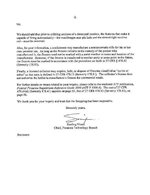- Thread Starter
- #61
You do not need to engrave it to do an in state private party transfer.
Not sure what point you are trying to make with your last statements. The point that I was making is that your statement above is totally incorrect. So the rest of your argument is moot. Regardless of state laws, state of transaction, state of residence, or interstate, once the newly milled lower is sold or transferred, even thru private party and in any state in the nation, it must be serialized or it's a Federal crime.













